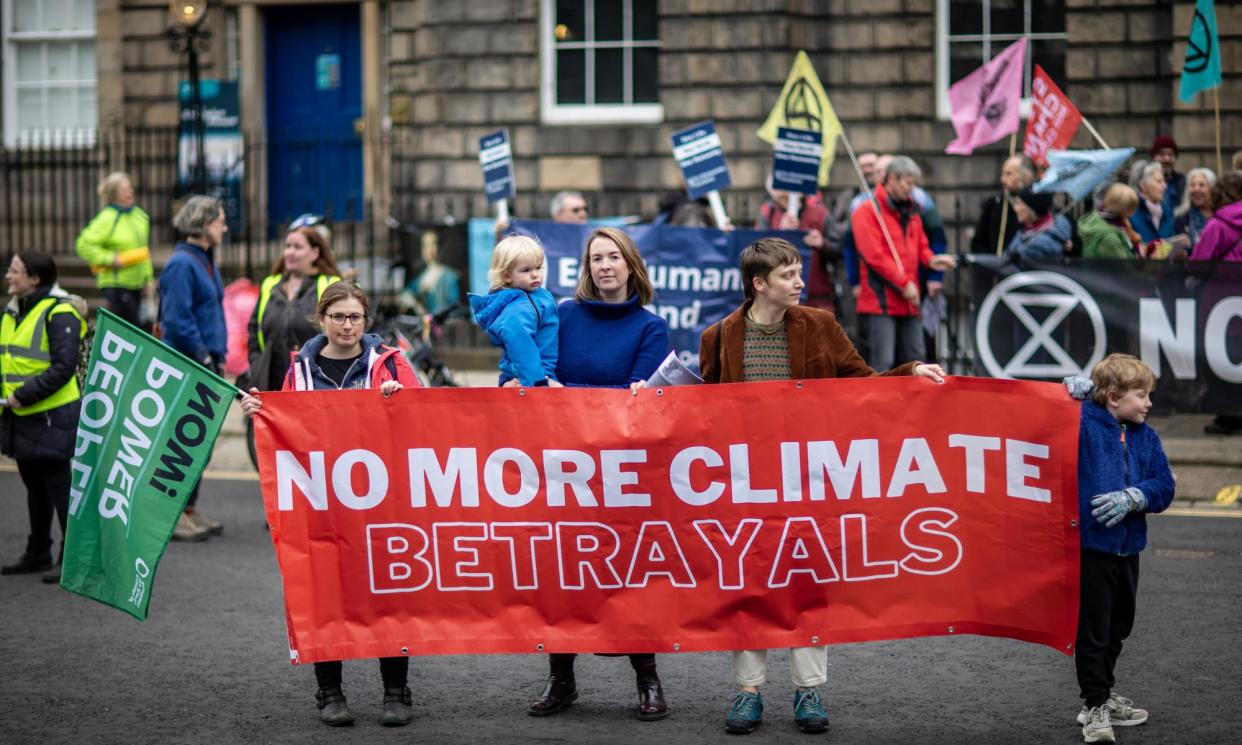‘There is despair’: fears for Scotland’s green policies as power-sharing ends

From the collapse of its ambitious target to cut carbon emissions by 75% by 2030, to the mothballing of a world-leading deposit return scheme for drinks containers, the much-heralded environmental objectives of the Scottish government appear to be falling apart.
As political opponents gather to exploit the fallout from Humza Yousaf’s departure as first minister, amid admissions he mishandled his Green party coalition partners, more long-term but pressing climate and environmental policies risk being sidelined at best, and buried at worst.
Patrick Harvie, who, along with his Scottish Green party co-leader Lorna Slater, was dumped unceremoniously from the power-sharing government by Yousaf, said many key environmental bills were at risk, including the natural environment bill to restore and regenerate biodiversity across Scotland by 2045; the introduction of more and better public transport; and the heat in buildings bill, to move all homes and businesses to a clean heating system by the end of 2045.
As a result, the optimism that greeted the 2021 SNP power-sharing deal – which put the Green party into ministerial positions in Scotland and involved key climate policies included in a Bute House agreement between the parties – is turning to despair.
Dr Richard Dixon, a former chief executive of Friends of the Earth Scotland and a former Scottish Environment Protection Agency board member, said: “There are lots of pressures [facing green policies] depending who becomes the next first minister; there could be major backsliding on green measures. There’s a great need for the non-governmental organisations and also opposition parties to keep the SNP’s feet to the fire on lots of these things.”
Some believe the fallout from the leadership tussle within the Scottish National party and potential moves away from an ambitious climate agenda have already started to happen.
This week, the stage 2 debate at Holyrood on the the circular economy bill – which would give ministers the power to set targets for local recycling, ban the disposal of unsold consumer goods, and place charges on single-use items, such as coffee cups – was delayed.
“There is despair amongst environmentalists,” said Kat Jones, of Action to Protect Rural Scotland (APRS).“There is so much urgency on environmental issues.”
The ambitious deposit return scheme (DRS), under which consumers would be asked to pay a returnable 20p deposit on drinks containers, had strong public support, consistently around 78%, and cross-party backing when the regulations were agreed by Nicola Sturgeon in 2017. Its demise is a sign to many that even key environmental policies, which were lauded and celebrated when they were forged, are at risk.
“A deposit return scheme is the simplest, most widely used circular economy measure in the world, which is used by half a billion people every day, yet it now won’t come in until at least 10 years after it was first agreed,” said James Mackenzie, of APRS.
A combination of politics, Scottish and national, vested interests and opportunism can be blamed for pushing the DRS into the long grass, and the same combination could scupper other climate policies, according to experts.
Jones said rumblings of discontent from some small businesses about the cost of the DRS had combined with a concerted media campaign that pushed far-fetched claims.. When she argued that small businesses would not shoulder the cost as there were measures to support them, few listened to the facts.
Instead, the adjective “controversial” began to routinely replace “popular” whenever the scheme was mentioned in the media or by politicians. Maurice Golden, a senior Tory MSP, likened the introduction of the scheme to Armageddon.
Meanwhile, industry bodies against the scheme were intensely lobbying Scottish politicians behind the scenes, according to Transparency International. Some believe this pushback against the deposit scheme is part of a wider culture war on all things green within Scottish politics.
After ministers scrapped the target to cut carbon emissions by 75% by 2030, Friends of the Earth Scotland said it was “the worst environmental decision in the history of the Scottish parliament”. And with a centre-right grouping inside the SNP opposed to many green measures, including Sturgeon’s move to call a climate emergency and accept that North Sea oil and gas drilling had to be cut, environmentalists are bracing themselves for a further backlash.
Many fear the crumbling of the totemic DRS – now pushed back to the end of 2027 – is the latest of many U-turns to come on the environment and climate.
“If we cannot get a simple, popular and tried-and-tested recycling measure over the line to implementation, what is the likelihood we could make the scale of changes that we need to make to deal with the climate and nature crises?” said Jones.
Rebecca Newsom, the head of politics at Greenpeace, said: “Political leaders come and go but public concerns about climate change and plastic pollution remain. The lesson from the Holyrood debacle is not that governments shouldn’t set ambitious targets to cut planet-heating emissions, but that targets need to be backed up by a clear action plan to meet them.
“Whoever becomes the next Scottish first minister should roll up their sleeves and get to work on climate solutions that can bring down energy bills, boost energy security and create jobs.”

 Yahoo News
Yahoo News 
